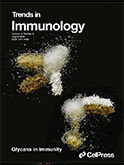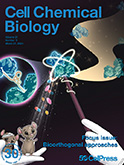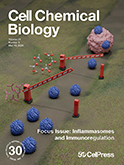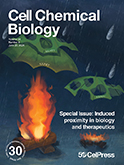Supporting Cell Press journals

Cell Chemical Biology is a Cell Press journal that aims to publish the most important advances in chemical biology research of exceptional interest for our diverse community, from basic scientists to clinicians. Launched in 1994 under the title Chemistry & Biology, the journal was the first to recognize the growing importance of investigations at the interface of chemistry and biology. The mission has always been to support and promote chemical biology and conversation and collaboration between chemical and life sciences.

Cancer Cell publishes reports of novel results in any area of cancer research, from molecular and cellular biology to clinical oncology. The work should be not only of exceptional significance within its field but also of interest to researchers outside the immediate area. In addition, Cancer Cell findings in cancer research, diagnosis and treatment. The goal of Cancer Cell is to promote the exchange of ideas and concepts across the entire cancer community, cultivating new areas of basic research and clinical investigation.

Cell publishes findings of unusual significance in any area of experimental biology, including but not limited to cell biology, molecular biology, neuroscience, immunology, virology and microbiology, cancer, human genetics, systems biology, signaling, and disease mechanisms and therapeutics. The basic criterion for considering papers is whether the results provide significant conceptual advances into, or raise provocative questions and hypotheses regarding, an interesting and important biological question. In addition to primary research articles in four formats, Cell features review and opinion articles on recent research advances and issues of interest to its broad readership in the Leading Edge section.

Trends in Cancer is a new member of the Trends review journals, offering concise and engaging expert commentary articles that address key frontline research topics and cutting-edge advances in the rapidly changing field of cancer discovery and medicine.
Trends in Cancer welcomes pre-submissions for Reviews & Opinions on Cancer and Oncology.
Pre-submission should be directed to the Editor at trendscancer@cell.com

Molecular Cell aims to publish the best research in molecular biology. The journal covers core cellular processes, including:
- DNA replication, recombination, and repair
- Chromatin biology and genome organization
- Transcription
- RNA processing and decay
- Non-coding RNA function
- Translation
- Protein folding, modification, and quality control
- Signal transduction pathways
- Cell cycle and checkpoints
- Cell death
- Autophagy
- Metabolism

Cell Reports is an open access journal from Cell Press and publishes high-quality papers across the life sciences spectrum that provide new biological insight. We publish thought-provoking, cutting-edge research in a variety of formats, including short-form Reports as well as longer-form Articles and Resources. Cell Reports is staffed with a team of passionate in-house editors who work closely with authors, reviewers, and the journal’s editorial board.
For over 40 years, Trends in Biochemical Sciences (TIBS) has kept readers up to date on recent advances across all disciplines of biochemistry and molecular biology. Through monthly, peer-reviewed publications, TIBS monitors the expanding scope of biochemistry while continuing to cover traditional subjects such as protein structure and function, signaling, and metabolism. Articles are curated by the Editor and authored by leading researchers in their respective fields. TIBS Review and Opinion articles have key goals to move beyond simply summarizing the literature to synthesizing the data, providing insights into the future direction of the field, and ultimately having a novel point of view.

Cell Metabolism publishes reports of novel results in any area of metabolic biology, from molecular and cellular biology to translational studies. The unifying theme is homeostatic mechanisms in health and disease, from simpler model systems all the way to the clinic. Published work should not only be of exceptional significance within its field, but also of interest to researchers outside the immediate area. Cell Metabolism also provides expert analysis and commentary on key findings in the field. The journal's mission is to provide a forum for the exchange of ideas and concepts across the entire metabolic research community, cultivating new areas and fostering cross-disciplinary collaborations in basic research and clinical investigation.

Trends in Endocrinology & Metabolism is a leading Reviews journal in the fields of metabolism and endocrinology. We publish polished, concise, highly read and cited articles of topics at the cutting edge covering basic, translational, and clinical aspects; from state-of-the-art treatments of endocrine diseases to new developments in molecular biology. Read about recent advancements in diabetes endocrine diseases, obesity, neuroendocrinology, immunometabolism, molecular and cellular biology, and a host of other areas.
TEM serves as an invaluable source of information for researchers, clinicians, lecturers, teachers and students. Reviews and Opinion articles form the foundation of each monthly issue. Reviews are invited from leading researchers in a specific field and objectively chronicle recent and important developments. Opinion articles provide a forum for debate and hypotheses. Our shorter pieces include Science & Society that highlight topical issues at the intersection of science, society and policy, Spotlights; that focus on exciting recent developments in the literature, and single-point hypotheses as Forum articles. Responses to previously published TEM content are welcome and encouraged in the form of Letters.
All articles are subjected to stringent peer-review, ensuring balance and accuracy.

Trends in Immunology plays an essential role in monitoring advances in the various fields of immunology, bringing together the results in a readable and lucid form. The backbone of each issue is a series of succinct reviews and hypothesis-driven viewpoints. Together with the other sections of the magazine they give the reader a complete picture of the diverse field of immunology.

Immunity is a monthly journal which publishes research articles and reviews of general interest in the entire discipline of immunology. Immunity was founded in the belief that advances in molecular and cellular immunology have brought immunology to a point at which a journal of high quality should be able to provide a unifying intellectual view, but the mandate for Immunity is not restricted to any particular level of analysis or to any particular type of system. The title Immunity is meant to indicate a breadth of interest extending beyond the formal definition of immunology, and into all systems that contribute to, or interact with, the immune system of the organism. Submitted articles are reviewed for both technical excellence and general interest, and those that are accepted are published within ten weeks.

Cell Reports Methods is an open access, multidisciplinary journal from Cell Press publishing significant methodological advances of broad interest. The primary criterion for publication in Cell Reports Methods is a robust, reproducible method that will spur scientific progress. We will also consider papers presenting a new tool or set of reagents that will be of significant utility and interest to the community. Cell Reports Methods publishes shorter, single-point stories, called Reports, in addition to a longer Article format. Areas of interest include innovations in sequencing and imaging technologies, genome editing, single-molecule approaches, computational methods, biotechnology, and synthetic biology.
We are committed to open science and scientific reproducibility. To promote these goals, we offer the following to our authors, reviewers, and readers:
- Opportunity to co-publish bench-top protocols through collaboration with STAR Protocols
- Application of the STAR Methods structure to ensure transparency and reproducibility
- Data and code required for reviewers at the time of submission
- Mandatory deposition of raw data at resubmission

Neuron has established itself as one of the most influential and relied upon journals in the field of neuroscience. The editors embrace interdisciplinary strategies that integrate biophysical, cellular, developmental, and molecular approaches with a systems approach to sensory, motor, and higher-order cognitive functions. Neuron serves as one of the premier intellectual forums of the entire neuroscience community.

Trends in Molecular Medicine’s objective is to facilitate communication between groups of highly trained professionals with distinct backgrounds and skills, whose common goals are to understand and explain the molecular basis of disease with a view to new clinical practice. Trends in Molecular Medicine is a resource for students and professionals alike, who have information needs that transcend the traditional clinical or scientific categorisation.

Cell Reports Medicine is a premium open-access journal from Cell Press publishing cutting-edge research in translational and clinical biomedical sciences that inform and influence human health and medicine.
The content published in Cell Reports Medicine reaches a broad range of scientists and clinicians across the spectrum of medical disciplines, ensuring that your work will be both visible and accessible. The journal publishes original research that ranges from exciting concepts in human biology, health, and disease to all phases of clinical work. We encourage submissions featuring innovative ideas that open up new directions in clinical research and practice, as well as studies that provide critical information that enriches our understanding of current standards of care in diagnosis, treatment, and prognosis. This includes, but is not limited to, translational studies, clinical trials in all areas of medicine including long-term trial follow-ups as well as work in genomics, biomarker discovery, and developments in technology that contribute to diagnostics, treatment, and healthcare. Studies based on vertebrate model organisms also fall within the scope of the journal, provided that the results are directly relevant to human health and disease.
Like our sister journal Cell Reports, we will consider impactful, single-point papers called reports, in addition to longer articles. Large datasets, techniques, and tools for the community can also be considered under the article format. We will also publish reviews covering recent literature in emerging and active fields.
The professional in-house scientific editors at Cell Reports Medicine work closely with authors, reviewers, and the journal's editorial board to ensure exemplary editorial process, fair and robust peer review, and rapid dissemination and communication of your research.

Cell Host & Microbe was launched in March 2007. The journal's mission is to provide a forum for the exchange of ideas and concepts between scientists studying the microbe with those studying the host immune, cell biological, and molecular response upon colonization or infection by a microbe.
Cell Host & Microbe will publish novel findings related to microbes (which includes bacteria, fungi, parasites, and viruses) from molecular and cellular biology to translational studies with particular emphasis on the interface between the microbe and its host (vertebrate, invertebrate, or plant; unicellular or multicellular). The unifying theme is the integrated study of microbes (pathogenic, non-pathogenic, and commensal) in conjunction and communication with each other, their host, and the cellular environment they inhabit. Work published in Cell Host & Microbe is expected not only to be of exceptional significance within its field, but also of interest to researchers outside the immediate area. In addition to primary research manuscripts, Cell Host & Microbe will publish expert analysis, commentary, and reviews on topics of current interest in the field.

Cell Genomics–a Cell Press gold open access journal–publishes cutting-edge, multi-disciplinary research at the intersection of genomics and the life sciences.
We offer a welcoming venue for authors and an indispensable resource for geneticists in all disciplines with research, datasets, and methods that has current utility and paves the way for the future.
We support authors throughout the publication process with an approach that includes editorial guidance, production expertise, and marketing outreach to ensure that the research we publish is seen by a broad, diverse community of researchers in all disciplines of genomics.

Trends in Cell Biology is among the leading review journals in molecular and cell biology. Review articles published each month monitor the breadth and depth of current research in cell biology, reporting on new developments as they happen and integrating methods, disciplines and principles. In addition to Reviews, Trends in Cell Biology publishes Opinion articles, which follow trends and provide innovative ideas to give insight into the implications of new developments and suggest future directions. All articles are commissioned from leading scientists and then subjected to stringent peer-review, ensuring balance and accuracy.
We also welcome short pieces. Forum articles aim to raise awareness about a topic of general interest for cell biologists or highlight a significant recent development in the field. Spotlight articles intend to provide a brief update on one or two recent research articles that represent a significant advance in a specific field of cell biology. Science & Society articles want to discuss important issues at the interface of academic research and society at large, such as those relating to policy, education, or public health.
Related publications

STAR Protocols
When it comes to protocols, usability and reproducibility are key. That's why STAR Protocols are structured, transparent, and accessible.
STAR Protocols works for you. If you're an author, we'll work with you to ensure you have the space and structure you need to explain what worked and perhaps, more importantly, what didn't. If you’re a reader, you can be sure that STAR Protocols meet the high quality standards you've come to expect from Cell Press.

Heliyon is an all-science, open access journal that is part of the Cell Press family. Any paper reporting scientifically accurate and valuable research, which adheres to accepted ethical and scientific publishing standards, will be considered for publication.

iScience publishes basic and applied research that advances a specific field across life, physical, and earth sciences. It's an open access journal with continuous publication, so research is immediately accessible. Our no-nonsense approach to submissions is simple, fast, and fair, and our commitment to integrity means we publish transparent methods, replication studies, and negative results.

Structure aims to publish papers of exceptional interest in the field of structural biology. The journal strives to be essential reading for structural biologists, as well as biologists and biochemists that are interested in macromolecular structure and function. Structure strongly encourages the submission of manuscripts that present structural and molecular insights into biological function and mechanism. Other reports that address fundamental questions in structural biology, such as structure-based examinations of protein evolution, folding, and/or design, will also be considered. We will consider the application of any method, experimental or computational, at high or low resolution, to conduct structural investigations, as long as the method is appropriate for the biological, functional, and mechanistic question(s) being addressed. Likewise, reports describing single-molecule analysis of biological mechanisms are welcome.



